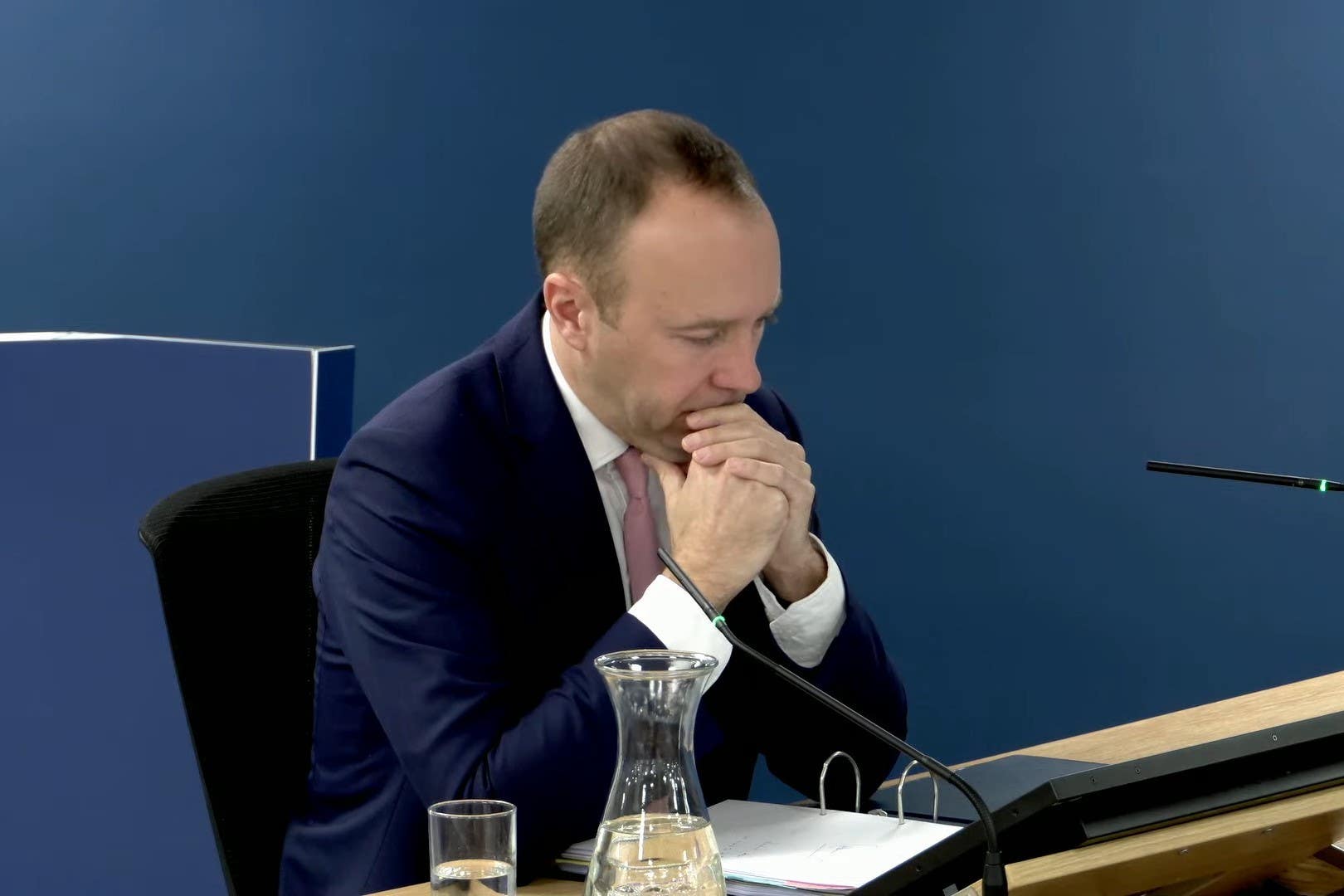Hancock says not overruling scientists was ‘biggest regret’
The former health secretary told the Covid-19 Inquiry he felt like a ‘broken record’ when pushing advisers on asymptomatic transmission.

Matt Hancock said not overruling scientific advice on the transmission of Covid-19 as the pandemic emerged was his “biggest regret”.
In a statement to the Covid-19 Inquiry, the former health secretary said asymptomatic transmission should have been a “baseline assumption” when the virus first emerged.
Mr Hancock said Public Health England (PHE) at the time was “adamant” that people without symptoms could not pass on the virus, adding he was told by Chief Medical Officer Sir Chris Whitty that the scientific consensus in January 2020 was that asymptomatic transmission was unlikely.
The inquiry was told Mr Hancock continued to push PHE on the issue and felt like a “broken record”. He repeatedly insisted asymptomatic transmission was not formally confirmed “when it really mattered”.
During a meeting on January 27 2020, Sir Chris said he was unable to guarantee that people without symptoms could not infect others, but added there was no evidence of this happening in Germany.
In February, wider evidence of asymptomatic transmission was emerging.
Asked how he responded at the time, Mr Hancock said: “This was a deep frustration to me at the time and, as I said, my single greatest regret, with hindsight, was not pushing on this harder and ultimately not overruling the formal scientific advice that I was receiving.”
He said he was aware of asymptomatic transmission in January 2020 after speaking to international experts.
Mr Hancock said: “I understood the implications of significant asymptomatic transmission and my recollection is I kept on pushing on this question in January and February especially.
“Here is an example of when the scientific method, which I enormously respect, comes into challenge and uncertainty because scientists, to be able to base policy on a different assumption, wanted concrete, scientifically credible evidence. What I had was essentially anecdotal evidence.
“The scientific method matters but it delayed the formal scientific advice telling us that we should base policy on an assumption that there can be asymptomatic transmission.”
Mr Hancock said it was a “source of frustration” that PHE was not prepared to change its guidance based on anecdotal evidence, instead relying on a “clinical scientific decision”.
He added: “I was the secretary of state. That frustration I had is that, with hindsight, I should have simply said, ‘That may be your scientific evidence and advice to me. However, we shall base policy on the assumption that there is asymptomatic transmission.’
It is deeply frustrating to me now and it was deeply frustrating to me at the time that being 'pretty clear' was not good enough to change the scientific advice I was receiving on which to base policy
“There would have been downsides to that assumption and there (are) reasons we didn’t do that. But essentially, with my hunch, which was that there is (asymptomatic transmission), I should have used that to overrule the science.”
When pressed by Hugo Keith KC, counsel to the inquiry, that there was evidence in February of asymptomatic transmission, Mr Hancock said: “So why couldn’t I get PHE to change the scientific advice? I hope you can understand how frustrating this was.
He added: “What I could have done was said, ‘I don’t know, that may be the formal scientific evidence, I’m overruling it’ and saying instead, ‘We’re going to assume asymptomatic transmission’. That would have had risks on the other side of assuming spread where it may have been unlikely to happen.
“Of course, I wish I had done that, hence my single biggest regret.”
Mr Hancock was read an excerpt from a message between Sir Chris and Sir Patrick Vallance, the then-chief scientific adviser, which said they had made it “pretty clear” by March that there was asymptomatic transmission.
Responding, Mr Hancock said: “It is deeply frustrating to me now and it was deeply frustrating to me at the time that being ‘pretty clear’ was not good enough to change the scientific advice I was receiving on which to base policy.”
Bookmark popover
Removed from bookmarks